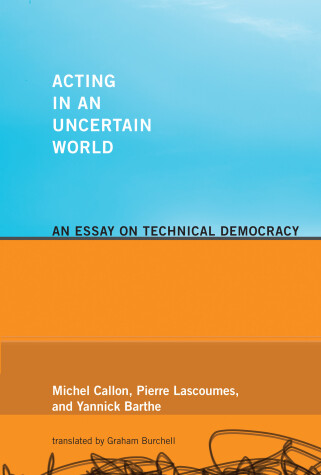Inside Technology
3 total works
Acting in an Uncertain World
by Michel Callon, Pierre Lascoumes, Yannick Barthe, and Graham Burchell
Controversies over such issues as nuclear waste, genetically modified organisms, asbestos, tobacco, gene therapy, avian flu, and cell phone towers arise almost daily as rapid scientific and technological advances create uncertainty and bring about unforeseen concerns. The authors of Acting in an Uncertain World argue that political institutions must be expanded and improved to manage these controversies, to transform them into productive conversations, and to bring about “technical democracy.” They show how “hybrid forums”—in which experts, non-experts, ordinary citizens, and politicians come together—reveal the limits of traditional delegative democracies, in which decisions are made by quasi-professional politicians and techno-scientific information is the domain of specialists in laboratories. The division between professionals and laypeople, the authors claim, is simply outmoded. The authors argue that laboratory research should be complemented by everyday experimentation pursued in the real world, and they describe various modes of cooperation between the two. They explore a range of concrete examples of hybrid forums that have dealt with sociotechnical controversies including nuclear waste disposal in France, industrial waste and birth defects in Japan, a childhood leukemia cluster in Woburn, Massachusetts, and mad cow disease in the United Kingdom. The authors discuss the implications for political decision making in general and describe a “dialogic” democracy that enriches traditional representative democracy. To invent new procedures for consultation and representation, they suggest, is to contribute to an endless process that is necessary for the ongoing democratization of democracy.
Radiance of France, The: Nuclear Power and National Identity After World War II
by Gabrielle Hecht and Michel Callon
To answer this question, Gabrielle Hecht has forged an innovative combination of technology studies and cultural and political history in a book that, as Michel Callon writes in the new foreword to this edition, "not only sheds new light on the role of technology in the construction of national identities" but is also "a seminal contribution to the history of contemporary France." Proposing the concept of technopolitical regime as a way to analyze the social, political, cultural, and technological dynamics among engineering elites, unionized workers, and rural communities, Hecht shows how the history of France's first generation of nuclear reactors is also a history of the multiple meanings of nationalism, from the postwar period (and France's desire for post-Vichy redemption) to 1969 and the adoption of a "Frenchified" American design.
This paperback edition of Hecht's groundbreaking book includes both Callon's foreword and an afterword by the author in which she brings the story up to date, and reflects on such recent developments as the 2007 French presidential election, the promotion of nuclear power as the solution to climate change, and France's aggressive exporting of nuclear technology.

